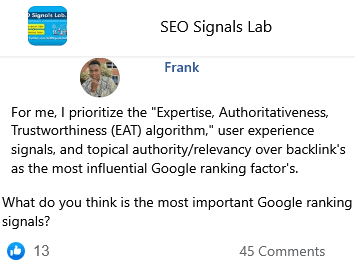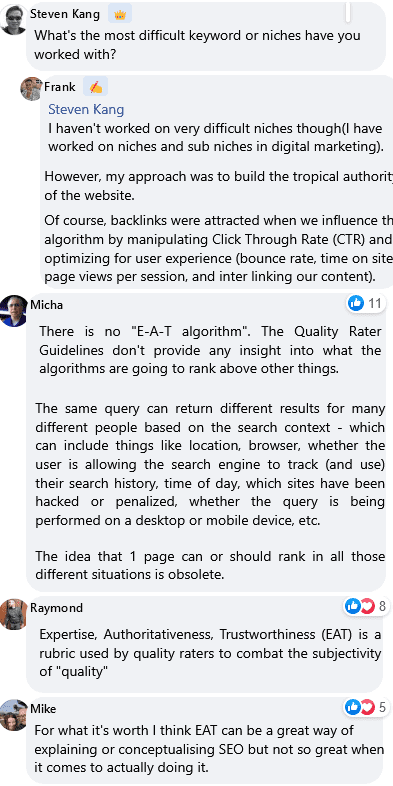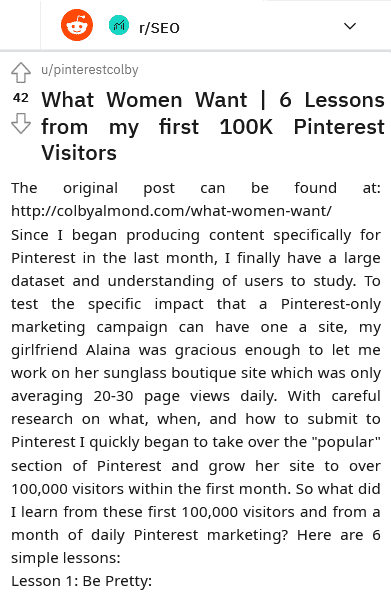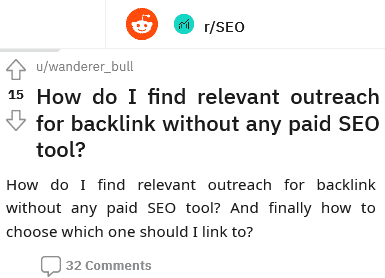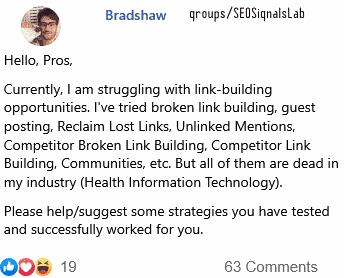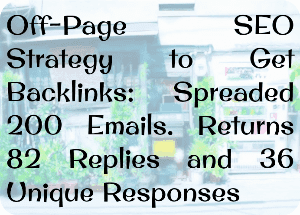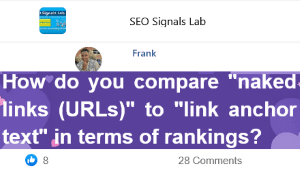For me, I prioritize the "Expertise, Authoritativeness, Trustworthiness (EAT) algorithm," user experience signals, and topical authority/relevancy over backlink's as the most influential Google ranking factor's.
What do you think is the most important Google ranking signals?
13 👍🏽13
📰👈
What's the most difficult keyword or niches have you worked with?
I haven't worked on very difficult niches though(I have worked on niches and sub niches in digital marketing).
However, my approach was to build the tropical authority of the website.
Of course, backlinks were attracted when we influence the algorithm by manipulating Click Through Rate (CTR) and optimizing for user experience (bounce rate, time on site, page views per session, and inter linking our content).
Micha
There is no "E-A-T algorithm". The Quality Rater Guidelines don't provide any insight into what the algorithms are going to rank above other things.
The same query can return different results for many different people based on the search context – which can include things like location, browser, whether the user is allowing the search engine to track (and use) their search history, time of day, which sites have been hacked or penalized, whether the query is being performed on a desktop or mobile device, etc.
The idea that 1 page can or should rank in all those different situations is obsolete.
👍🏽11
Raymond
Expertise, Authoritativeness, Trustworthiness (EAT) is a rubric used by quality raters to combat the subjectivity of "quality"
💟8
Mike
For what it's worth I think EAT can be a great way of explaining or conceptualising SEO but not so great when it comes to actually doing it.
💟5
📰👈
Truslow 🎓
Trying to figure out the most important ranking signals is like trying to figure out what is most important for survival – air, food, water, or shelter. True… you're going to need one of these before the others, but in order to succeed you're going to need them all.
As such, with Search Engine Optimization (SEO), one of the most dangerous things you can do is try and figure out that one (or handful of) "most important things". Each case is different. While we humans need to prioritize air right away, a fish can put that near the end of the list since it just replenishes the O2 that it gets from the water. Your SEO project has the same sort of things going on. In some cases, I can rank you for many things with but one or two links – while in others, I need as many as possible. In some cases I can spit out keyword spam for days and rank like a king, while in others I'm going to need to put together some pretty solid facts just to get Google to consider crawling the site, not to mention ranking it.
Ultimately, the most important ranking signal is to get as many ranking signals right as you possibly can – and if you can't get them right, at least be absolutely consistent with your signals.
And, while I agree with much of the sentiment above that E-A-T is not a ranking signal (nor, is it an algorithm, especially) it is something important to consider in many niches because it gives us "clues" (not an actual recipe, nor even specific ingredients) as to the types of things that the real algo is trying to leverage. And it's really only super important in a very limited sector right now. In a huge number of cases, you still have 3-4 years of being able to play the old "match the keywords and get links" game and still come out a winner.
💟2
The survival training I got placed a LOT of importance on knowing the priority to sort out Air, Shelter, Water, and Food in that there are situations where if you don't sort the right one before it becomes important, the others don't matter, you're either dead, or too sick/weak to do any others anyway. 😃
That said, I fully agree with the overall gist of it all. But I personally think there is great value in thinking about which signals (and I use the plural here on purpose) might be used to know, from the data a search engine can freely collect in all cases, universally, (because if a measurement can't be applied to all, it is useless to apply to any) might denote and assess a level of 'Expertise', with high signal to noise ratio and good practical granularity. The same for Trust, and for Authority.
Just don't then assume you are right (although it might give you something interesting to test). Sometimes what may seem logical and easy as a signal from an outsider's perspective just doesn't scale to the entire web in a way that a search engine can use in returning results within X nanoseconds.
Google themselves were pretty adamant though that what mattered was Links, Content, and Query intent – thought the actual quote at the time was "Content, Links and RankBrain".
https://searchengineland.com/now-know-googles-top-three-search-ranking-factors-245882If you watch the video carefully, you can see my reaction, because did you see what he told us? He said what matters is: On-page (Content), Off-page (Links), and How Google process queries. In other words, 'everything'. 😃 I wasn't sure whether to laugh, applaud the brilliance of the genericness of the answer, or be annoyed. But actually, thinking about that third point, and that he basically said it is, in its way, just as important as anything you have on page, or anything off-page, was a point well-made.
It's still one of the most brilliantly evasive, generalized answers ever, but that's in part because the question itself is as uselessly generalized.
💟2
Truslow 🎓
I didn't say it was a danger to prioritize once you have a specific case – but as I said… if I make a checklist that prioritizes it air, water, food, shelter – and then my next client is a fish, the priorities are going to be completely different. And then if my next client is human again, but it's January in Greenland as opposed to January in Florida like my first client – the shelter priority is going to move up to second place.
And yeah – I remember that video and chuckling about it with someone (maybe you? Maybe someone else) back around the time it came out – though the first two have always been the answer since day one and the front end processing is new (in the grand scheme of things, anyway). Long before rankbrain we did have some basic pre-search things going on like pluralization and synonyms and more little things like that.
But yeah – we're saying the same thing, I think… just in different ways. You've got to do it at at some level – and the more you can do with the budget you've got, the better your results. And sure, you do have to prioritize, but the priorities change greatly depending upon the client.
Kristine
It is not a ranking signal Google does not evaluate EAT. There is nothing in Google's algorithms that equals EAT — that is just something from the Quality Raters Guide. You can use it as a guide on how to do a good website or a good content but it's not a ranking factor.
📰👈
Kathy
I knew you were going to get hit with the "Expertise, Authoritativeness, Trustworthiness (EAT) is not at ranking factor" arguments. 😉 I tend to agree with you. I've seen tons of evidence that engagement is a ranking factor, that it trumps everything as a matter of fact, and that you have a much better chance of achieving rank if you have EAT
Before EAT, I used to teach, you have to get your RAP on – Relevancy, Authority, Popularity. EAT is wrapped up in all those, so I never felt Google was saying anything new, and that it was just clarifying what it wanted all along.
Micha
Google doesn't have an EAT algorithm, but if it did then the Quality Rater Guidelines would be describing something else the raters would have to use to evaluate the search results they're shown. E-A-T is how the quality raters check the algorithms' effectiveness. It is not, never has been, and never will be a blueprint for optimizing for search.
Nor does Google use engagement data as direct ranking signals. They do use data from the Chrome User Experience report in computing Core Web Vitals, but the impact of Core Web Vitals (CWV) on search results rankings is minimal because at the end of the day they must still prefer relevance over page experience.
The benefit of understanding how search engineers describe expertise, authoritativeness, and trustworthiness is to help you look at the search results without all the SEO felgercarb ("put your keywords HERE" and "link to THIS" and "use THIS anchor text" and "put a bio page on there" etc.).
If you're taking the QRG and using that to construct an SEO formula that creates "ranking signals" then you're doing it all wrong. The examples in the QRG don't show you what's going to rank at the top. They show you what Google engineers think is good or bad content.
And those examples can change over time as searchers' behavior show them that acceptable content preferences have changed.
Thanks for this concise definition
Mišo
E-A-T is vital for long-term survival in competitive niches. However, it is certainly not an algorithm.
Search Quality raters paint an ideal picture of the world. They say what is worth ranking in real life and what isn't.
Google is testing the performance of its algorithms against that ideal world and are on the never-ending mission to get as close as possible.
True E-A-T cannot be demonstrated on the website as a "thing to do". There is nothing specific about it; it is a whole philosophy that drives everything in the company, whether offline or online. It is the level of trust perceived by real people.
This perceived trust level will trigger hundreds of different "ranking factors" consistently over time if it is high. It will also help a website gain quality links effortlessly.
📰👈
Raw Backlinks are Blunt as an SEO Factor?
The Power Of Schema: Sites with Good Links in a Competitive Space Can Get Away with Rankings Without Schema
Do Private Blog Networks (PBN)s still work?
Does Free Backlinks from Directory Submission Websites Give SEO Benefits, Especially Traffic?
